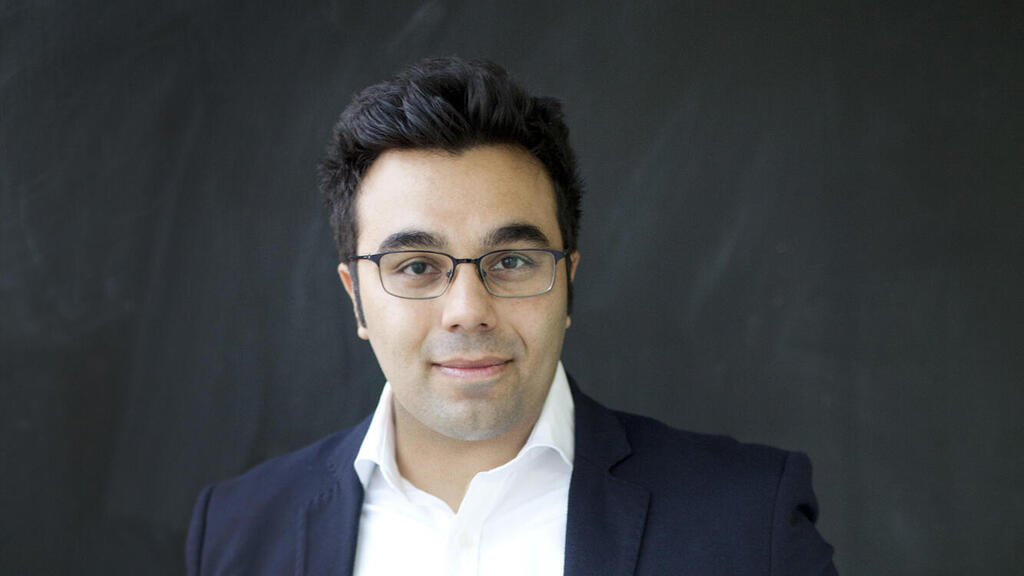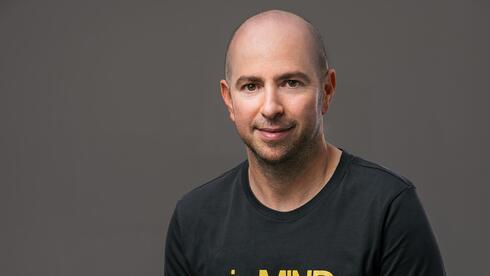
2024 VC Survey
“Corporations and investors recognize Israel’s value as a technology and innovation powerhouse.”
Moran Chamsi, Managing Partner and Co-founder at Amplefields Investments, joined CTech to discuss the state of the Israeli VC space in 2024.
“The protests in early 2023 had an impact on the economy, and particularly on the high-tech industry,” said Moran Chamsi, Managing Partner and Co-founder at Amplefields Investments. “While it was put on pause due to the current war, I believe that the high-tech sector will have an important role, as the largest single contributor to the national GDP, in bringing about healing and discourse in Israeli society. Because the industry is global and diverse, with Israeli talent representing every demographic (religious, secular, Arab, Jewish, etc) the sector is a natural leader for advocacy and can use that position to bring about consensus.”
Chamsi joined CTech for its 2024 VC Survey to share how the sector can bounce back amid war.
1 View gallery


Moran Chamsi, Managing Partner and Co-founder at Amplefields Investments
(Photo: Merev Ben Loulou)
“When the current war broke out, the international community discovered that Israeli tech delivers no matter what – and it’s not just a saying,” he continued. “The resilience of the tech sector in Q4 2023 and into 2024 has made a lasting impression, and global corporations and investors alike recognize Israel’s underlying value as a technology and innovation powerhouse.”
VC fund ID
Name of the fund/funds: Amplefields Investments
Sector: Secondary Fund investing in late-stage, Israel-related high-tech companies
Leading partners: Moran Chamsi, Managing Partner and Co-founder
Selected portfolio companies: OpenWeb, eToro, Via, StoreDot
From your perspective, was 2023 a ‘lost year’, or can the events that happened during it be seen as a springboard for opportunities in 2024?
2023 was a very difficult year – for the high-tech market, for citizens, and for families. The Israeli high-tech ecosystem was subjected to a perfect storm: Global economic events, Israeli political developments, and the outbreak of war made it very challenging to operate, raise capital, and invest.
While this occurrence was a rare confluence of events, corrections and downturns are also not something new. 2023, while difficult for many companies, served as an effective sieve so that only the very compelling early-stage companies were able to secure funding, and larger companies were forced to optimize for capital efficiency. And the outcome of a trying year like 2023 produces a more realistic environment for investment and a healthier economy.
From our perspective as a Secondary Fund, the drop in valuations created opportunities for more investors who were able to enter the market after having held back during the heady valuation days of 2020-2021. As a response to the difficult environment, secondary funds like ours were providing liquidity to early-stage investors to reinvest in the market. From our point of view, we can see the smaller transactions that signal a movement toward growth. We see 2024 as a rebuilding year when we will see more growth opportunities, and 2025 as potential for larger market moves for the companies that are IPO-ready.
What do you believe is more crucial to the state of Israeli tech: the influence of global processes and the global economy, or the local events ranging from the political protest to the war state?
Absolutely, both global processes and the global economy, as well as local events, significantly impact Israeli tech. While foreign investment plays a crucial role, Israel's robust tech ecosystem thrives due to a unique blend of factors.
These factors include: excellent local talent, government spending on innovation, cooperation between government institutions and global corporations, Israeli society’s enthusiasm for entrepreneurship evident in the number of students pursuing these careers, and the resilience of the organizations growing in the local economy.
Related articles:
The recent decline in foreign investment acts as a stress test, revealing the underlying strength of these internal factors. As Warren Buffett famously said: "It's only when the tide goes out that you see who's been swimming naked." While foreign capital is crucial, Israeli tech's resilience in the face of a global slowdown demonstrates the depth and diversity of its homegrown ecosystem.
Has the prestige of Israeli high-tech been damaged, or are the protests and the war merely a 'small bump in the road' from which the sector can recover within months?
The protests in early 2023 had an impact on the economy, and particularly on the high-tech industry. While it was put on pause due to the current war, I believe that the high-tech sector will have an important role, as the largest single contributor to the national GDP, in bringing about healing and discourse in Israeli society. Because the industry is global and diverse, with Israeli talent representing every demographic (religious, secular, Arab, Jewish, etc) the sector is a natural leader for advocacy and can use that position to bring about consensus.
When the current war broke out, the international community discovered that Israeli tech delivers no matter what – and it’s not just a saying. The resilience of the tech sector in Q4 2023 and into 2024 has made a lasting impression, and global corporations and investors alike recognize Israel’s underlying value as a technology and innovation powerhouse.
How much effort was required of you to maintain the fund's status with your investors in 2023? What were their primary concerns and how did you address them?
We knew that 2023 would be a year for belt-tightening among portfolio companies. As a secondary fund, we also knew that the lack of available liquidity to many companies would create opportunities for investment. Amplefields invests in late-stage companies that have been able to weather the storm by relying on cash reserves and the substantial revenues that characterize mature companies. So our investors were not too concerned in early-mid 2023. In October, our investors and colleagues abroad were very empathetic and concerned for us on a personal level. On the professional level, they did seek assurances at first regarding the prospects for the portfolio being impacted by the war. But by the end of 2023, they were reassured by indications of the industry’s resilience, and cautiously optimistic as more and more reservists return to civilian life, with confidence in the Israeli high-tech ecosystem.
How are you preparing for the most pessimistic scenarios, such as the continuation of the war in Gaza deep into 2024, the opening of another front in the north, or further reduction of government support for high-tech?
Amplefields is a conservative investor, with comprehensive risk management protocols. This includes portfolio diversification across domains in the high-tech sector and investment in Israeli-related companies which are based both domestically and abroad. We have updated our protocols accordingly over the past two quarters to ensure that they respond to the current situation
Did you raise fund money in 2023 for an existing fund or a new one? What are your expectations regarding this matter for 2024?
During 2023, the challenging environment for companies to raise funds and the need for liquidity increased the opportunities for Amplefields as a secondary investor to review more opportunities and expand our portfolio. This increase in deal flow was the impetus for Amplefields' decision to expand investment activities and raise capital in 2024. Amplefields anticipates that the need for secondary investment will continue and a new portfolio dedicated to these activities will provide opportunities for investors to remain active in investing in Israeli high-tech while maintaining a lower-risk profile.
How many investments did you make in 2023, and how does it compare to 2022?
In early to mid-2023, similar to the rest of the investment community, we saw a drop in deal flow, as investors and companies had yet to meet at agreeable valuations. By late 2023 the realization that the 2021 levels would not be returning immediately had sunk in, triggering a significant influx in secondary transactions. As companies refine their valuations, we are adjusting our own strategy to focus on the companies with strong EBITDA figures. By the end of 2023, we saw a surge in quality deal flow (approximately 50-75% increase) in mature companies that needed liquidity for early-stage investors and employees. We anticipate that these transactions will lead to further investments in the coming year.
In your view, will the amounts and/or the number of deals in 2024 be more like those of 2023 or 2021-22?
2024 will most likely be a rebuilding year with a slightly higher investment than 2023. We already see indications of a recovery from 2023 in terms of the number of deals but not in valuations. 2021 was an outlier year due to a convergence of factors increasing investment valuations, round size, and the number of deals.
As a secondary investor, we have perspective on the transactions initiated by existing investors that serve as an early indicator for investment in high-quality companies. The primary rounds that companies are hoping for will follow. Steady growth will eventually bring the market back to the level of activity that we saw in 2021-22, but not within one year.
Which high-tech sectors will you focus on in the upcoming year? Which areas will maintain their prominence, and which ones appear less attractive?
Amplefields invests across high-tech sectors, and we see consistent demand for the established domains where Israeli companies lead the industry, such as cybersecurity and cloud computing. In addition, as the AI sector continues to mature, with solutions developing in healthcare, finance, and manufacturing, this sector is beginning to represent a larger share of the late-stage opportunities we see. Big data and analytics companies have also continued to mature this year, with demand increasing for solutions addressing the needs of businesses to optimize operations and make informed decisions.
Which type of companies stand a better chance of garnering increased attention from VC funds this year - early-stage or advanced rounds?
We anticipate a continued focus on later-stage (advanced) rounds in 2024, with cautious investments in early-stage opportunities. Here's our reasoning:
Market Volatility: Investor sentiment remains cautious due to factors like the ongoing war and potential recessionary pressures. This translates to a preference for companies with proven traction, established business models, and a clear path to profitability – characteristics often found in later-stage companies.
Reduced Risk Tolerance: The flight-to-quality trend observed in 2023 is likely to continue. Investors may prioritize established companies with a lower risk profile and demonstrably strong unit economics over unproven early-stage ventures.
What changes will you implement in your approach to evaluating investments in startups in the coming year, compared to the previous two years? What practices will you abandon, and what criteria will you now demand from founders?
While Amplefields is more discerning regarding new investments this year, we find that the influx of investment opportunities invites the firm to double down on its existing strategy, and to focus on accuracy in due diligence, and executing on investment principles. Our fund invests in late-stage startups, and as such, our evaluation process prioritizes metrics that signal a company's readiness for the public market:
- Emphasis on profitability: Unlike early-stage startups where rapid user growth is a key indicator, late-stage companies should demonstrate a clear path to profitability. We will analyze financial statements to assess their revenue streams, cost structures, and profitability margins.
- Sustainable business model: We will look for companies with a strong value proposition and a sustainable competitive advantage. This ensures they can not only acquire customers but also retain them over time.
- Market Potential: Evaluate the size and growth trajectory of the target market the startup operates in. Look for markets with significant growth potential to ensure the company has room to scale.
- Unit Economics: Analyze the cost of acquiring a customer (customer acquisition cost) and the lifetime value of a customer to assess the startup's profitability potential.
- Exit Strategy: Understand the founders' vision for the company's eventual exit, whether through an IPO, acquisition, or other means. This helps align your investment goals with the founders' plans.
- Regulatory Landscape: Consider any regulatory hurdles that could impact the startup's operations or growth potential.
Do you think it is likely we will witness encouraging IPOs, the emergence of unicorns, or remarkable exits in 2024?
Amplefields’ outlook on the 2024 IPO landscape remains guardedly optimistic, and we expect that 2024 will be a rebuilding year, with more deals and value growth. We don’t see the emergence of unicorns as the most significant indicator of success for the Israeli high-tech ecosystem. I think we will see the development of real value contributions to the world in terms of product development and the growth of quality companies leading technological domains.
The remarkable valuations and IPOs will follow. Market sentiment suggests a potential rebound in mid-late 2025, fueled by anticipated interest rate cuts. However, a key factor will be the performance of category-leading Israeli technology companies proving their value and impact. As companies mature, they will be prioritizing the criteria that public market investors look for: stable profitability and financial metrics over time, steady growth, and consistent company leadership. Overall, encouraging exits are likely, with a focus on mergers and acquisitions rather than a surge of blockbuster IPOs. This underscores the current emphasis on profitability over hypergrowth.
Practical and current tips for founders planning upcoming money-raising efforts - focus on the current market environment and sentiments.
The fundraising environment for Israeli tech companies is challenging this year, but there is capital available and investors are looking for the right opportunity.
Founders can strengthen their pitch to potential investors by showcasing a deep understanding of their target market and competitor landscape. This involves defining their ideal customer profile, highlighting unmet needs, and demonstrating how their value proposition surpasses competitors. By incorporating market research data and compelling customer stories, founders can paint a clear picture of their market opportunity and competitive advantage, giving investors confidence in their ability to navigate the current market climate and achieve sustainable growth.
- Highlight Unit Economics: Investors are looking for companies with strong unit economics – metrics that show how much profit is generated per customer acquired. Showcase a clear path to profitability by demonstrating a sustainable customer acquisition cost (CAC) and growing customer lifetime value (LTV).
- Focus on Metrics, Not Just Hype: While a compelling story is important, back it up with data-driven evidence. Present key performance indicators (KPIs) that demonstrate traction and validate your growth potential.
- Prioritize Building Strong Relationships with Potential Investors Early On:
- Engage in Proactive Investor Targeting: Don't wait until you need funding to start building relationships. Identify VC firms that align with your sector and stage of growth. Connect with investors through industry events, conferences, or warm introductions.
- Focus on Quality Over Quantity: It's more valuable to cultivate relationships with a few targeted investors who understand your business and share your vision than to simply cast a wide net.
- Communicate Regularly: Keep potential investors updated on your progress, milestones achieved, and any significant developments. Maintain open communication to build trust and demonstrate your commitment to transparency.
Name two portfolio companies that you think will thrive in 2024:
OpenWeb
Sector: The leading engagement and moderation solution for online content publishers, with more than 100 million monthly users.
Founders + year of establishment: In 2015 by CEO and Founder Nadav Shoval
Reasoning why this is their year:
As the developer of a solution for digital publishers, OpenWeb is due to experience significant growth in 2024. This year demand for content is expected to focus on the Summer Olympic Games in Paris, and the US General Election in November. The company’s M&A transactions over the past three years have built out the robust solution and its addressable market, making it a category leader.
eToro
Sector: Fintech / eToro is a social trading and multi-asset investment company that focuses on providing financial services
Founders + year of establishment: In 2007 by CEO and Founder Yoni Assia
Reasoning why this is their year:
eToro provides access to financial services and public market investment to the world, democratizing finance. In 2024 the company is expected to launch its IPO as announced by the CEO Yoni Asia.












